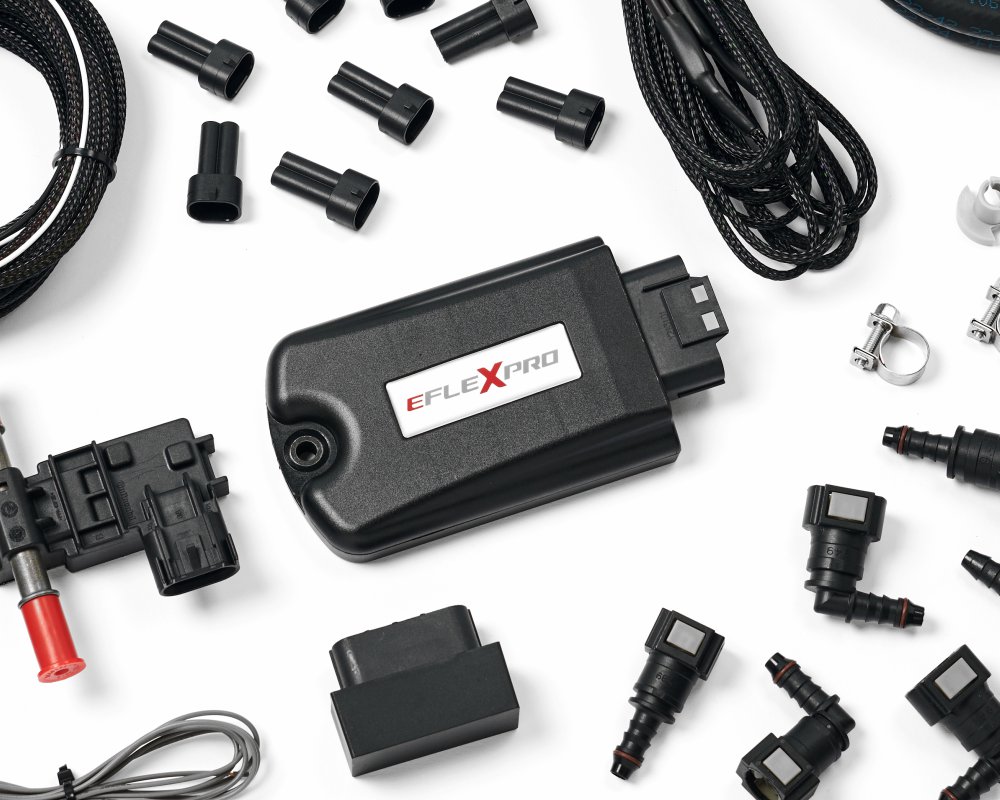E85 vs. Gasoline: Environmental Impact
While outdated myths persist about E85's environmental impact, modern scientific data demonstrates that today's ethanol production is more efficient, sustainable, and environmentally beneficial than ever before.
We’ve created this E85 Vs. Gasoline: Environmental Impact document to shine a light on the reality of E85 emissions.
The Simple Facts Summarized
E85 reduces greenhouse gas emissions by 44–52% compared to gasoline, cuts cancer-causing particulates by 95%, and supports cleaner combustion. Peer-reviewed studies from Harvard, MIT, and U.S. national labs confirm these benefits, debunking outdated myths about land use or production inefficiencies. 2 8 19
Key Environmental Benefits
1. Greenhouse Gas Reductions
- Corn ethanol’s carbon footprint dropped 23% since 2005 due to farming and production advances. 8 19
- Lifecycle emissions are 44–61% lower than gasoline, with advanced methods achieving up to 70–80% reductions. 9 11 14
- Ethanol use since 2008 has prevented 980 million tons of transportation-related CO₂ emissions. 2 14
- Plug-in hybrids using E85 match electric vehicles (EVs) in lifecycle emissions when accounting for battery production and grid energy sources. 7
2. Toxic Pollutant Cuts
- 95% lower particulate matter emissions vs. gasoline. 5
- 87% less carbon monoxide and 83% fewer cancer-causing compounds in tailpipe emissions. 2 5
3. Sustainable Farming Progress
- U.S. cropland decreased by 22 million acres since 2007 despite higher ethanol output. 6
- Fertilizer use per bushel fell 50–70% since 1970 via precision agriculture. 1 6
Debunking Myths
close Myth: “Ethanol Production Expands Cropland”
check Fact: Total U.S. cropland shrank 5.5% (2007–2016) while corn yields jumped 15% through improved farming practices.
close Myth: “E85’s Carbon Footprint Rivals Gasoline”
check Fact: A flawed 2022 study claiming parity was debunked for ignoring data. Current models prove 44–61% lower emissions.
Data-Driven Comparison
| Metric | E85 Advantage | Source |
|---|---|---|
| CO₂ Reduction | 44–52% | Argonne National Lab 8 19 |
| Particulate Matter | 95% | Swiss Federal Lab 5 |
| Farmland Efficiency | +180% Yield | USDA 6 |
Deep Dive: Science & Sustainability
Cleaner Combustion
E85’s high oxygen content promotes complete fuel burn, slashing:
- Carbon monoxide (CO) by 35%. 2
- Polycyclic aromatic hydrocarbons (PAHs) by 82–96%. 5
Future Potential
- Next-gen ethanol could achieve 70–80% emission cuts via agricultural waste and renewable energy. 8 13
- 100% renewable E85 in hybrids reduces lifecycle emissions by 61% vs. gas, even rivaling EVs in low-carbon grids. 7
The Bottom Line
Decades of innovation have made E85 a scientifically validated eco-friendly choice, verified by decades of peer-reviewed research confirming E85’s environmental superiority over gasoline 2 9 11 14 With emissions falling faster than gasoline alternatives and myths rooted in obsolete data, switching to E85 through eFlexFuel offers measurable environmental benefits without compromising vehicle reliability or performance.
Greenhouse Gas Reductions (Full Data)
- Argonne National Lab: Ethanol’s carbon intensity fell from 58 g CO₂e/MJ (2005) to 45 g CO₂e/MJ (2019). 8 19
- Harvard/MIT: Corn ethanol reduces emissions by 46%, with advanced methods hitting 61%. 9 11 14
Farming Efficiency (USDA Analysis)
- Corn yields per acre increased 180% since 1970 with 50% less nitrogen fertilizer. 16
- Ethanol production consumes 3x less energy than it generates. 8 19
EV-Competitive Analysis (IFPEN 2024)
- Plug-in hybrids using E85 achieve 61% lower emissions than gas vehicles, matching EVs in regions with high renewable energy adoption. 7
How many metric tons of CO₂ would you save by running E85 via eFlexFuel?
Average annual mileage is around 15,000 miles.
Most cars average 30mpg, most SUVs average 25mpg, and most trucks average 18mpg.
Running E85 requires more fuel. Smaller vehicles (e.g. Toyota Prius) may see a decrease around 10-15% while larger vehicles typically see a decrease of 15-20% MPG.
If you don't know how much E85 costs in your area, visit E85Prices.com
Consider whether your vehicle requires Standard or Premium gasoline.
If you don't know how much gas costs in your area, visit AAA's gas price map.
About Fuel Consumption help
Consumption on E85 varies depending on what kind vehicle you drive. Usually smaller and newer cars have lower consumption increase compared to gasoline than bigger and older cars. Hybrids also tend to have smaller consumption increase. This is due to the fact that newer vehicles tend to be more able to benefit from E85's better knock resistance than older vehicles. In emission lab conditions, by measuring fuel weights, we have generated as low as 12% difference between regular gasoline and E85 on a hybrid vehicle.
Driving style/environment also affects how much E85 mileage turns out to be compared to gasoline. Fast driving with varying speeds and a lot of accelerations tends to lower E85 mileage (20 to 30% lower than of gasoline) while easy driving with steady speeds for long sequences tends to generate significantly higher mileage (10 to 20% lower than gasoline). With E85, this phenomenon is amplified compared to gasoline. More performance oriented engines typically run with slightly rich AFR for safety reasons and this increases the consumption in demanding driving conditions and in high output engines.
saved
in 3 years
metric tons CO2 saved in 3 years
Equally to plant and grow trees annually
Flights from L.A. to San Francisco
+Sources & References
- www.anl.gov/argonne-scientific-publications/pub/165585
- nebraskacorn.gov/cornstalk/sustainability/how-ethanol-reduces-greenhouse-gases/
- http://ui.adsabs.harvard.edu/abs/2021ERL....16d3001S/abstract
- d35t1syewk4d42.cloudfront.net/file/2176/Pledging%20a%20Net-Zero%20Future%202022.pdf
- www.greencarcongress.com/2016/10/20161024-empa.html
- ers.usda.gov/data-products/charts-of-note/chart-detail?chartId=82261
- www.bioethanolcarburant.com/wp-content/uploads/2022/06/PR-IFPEN-study-June-2022-EN2.pdf
- www.greencarcongress.com/2021/05/20210526-ethanol.html
- eheinc.com/project/environmental-research-to-support-evidence-based-decisions-the-case-for-challenging-corn-ethanols-prevailing-carbon-intensity-value/
- eheinc.com/news-events/corn-ethanol-emits-46-less-greenhouse-gases-than-gasoline/
- advancedbiofuelsusa.info/harvard-tufts-ehe-scientists-find-corn-ethanol-reduces-carbon-emissions-by-nearly-50
- www.iea-amf.org/content/projects/map_projects/54
- www.osti.gov/servlets/purl/1904178
- d35t1syewk4d42.cloudfront.net/file/2069/Ethanol%20a%20Low-Carbon%20Solution.pdf
- kycorn.org/ncga-responds-epa-sab-comments-ethanol/
- www.dtnpf.com/agriculture/web/ag/blogs/ethanol-blog/blog-post/2023/03/02/study-rfs-greenhouse-gas-emissions
- mobilitynotes.com/on-the-carbon-intensity-of-ethanol/
- www.osti.gov/biblio/1828996
- www.anl.gov/article/corn-ethanol-reduces-carbon-footprint-greenhouse-gases
- cen.acs.org/business/specialty-chemicals/ethanol-fuel-low-carbon-future/101/i6
- downloads.regulations.gov/EPA-HQ-OAR-2021-0427-0273/content.pdf
- ethanolproducer.com/articles/ci-of-corn-ethanol-down-23-with-additional-reductions-possible-18223
- www.greencarcongress.com/2021/01/20210127-scully.html
- www.eesi.org/articles/view/ethanol-reduces-a-variety-of-harmful-emissions-new-study-finds
- www.sciencedirect.com/science/article/pii/S0304389425017303
- icca-chem.org/wp-content/uploads/2020/05/ICCA_17-Case-Studies_Technical-Reports_WEB.pdf
- www.lifecycleassociates.com/pathways-for-carbon-negative-biomass-fuels/
- www.rd.usda.gov/media/file/download/usda-rd-economic-impact-analysis-us-biobased-products-industry-2023-508.pdf
- advancedbiofuelsusa.info/ehe-study-shows-corn-ethanol-emits-46-less-greenhouse-gases-than-gasoline-finding-differs-from-conventional-wisdom-suggesting-only-20/
- www.cibotechnologies.com/blog/future-proofing-ethanol-and-saf-ci-scoring-with-cibo/
- gaftp.epa.gov/air/emismod/SPECIATE_supportingdata/v4_2/Low%20Blend%20Ethanol%20Report%2004-27B%20-%20Reg&Unreg%20Final.pdf
- 19january2017snapshot.epa.gov/sites/production/files/2015-08/documents/420r07004.pdf
- hero.epa.gov/hero/index.cfm/reference/details/reference_id/1630212
- www.epa.gov/system/files/documents/2024-04/us-ghg-inventory-2024-chapter-3-energy.pdf
- www.epa.gov/sites/default/files/2015-09/documents/mackinnon_pres.pdf
- www.epa.gov/sites/default/files/2019-09/documents/epa_non-co2_greenhouse_gases_rpt-epa430r19010.pdf
- www.epa.gov/system/files/documents/2024-04/us-ghg-inventory-2024-chapter-7-waste_04-17-2024.pdf
- www3.epa.gov/ttn/naaqs/aqmguide/collection/cp2/20070501_72fr_23900-27014_regulation_fuels_fuel_additives.pdf
- ethanolproducer.com/articles/epure-new-research-confirms-ethanol-reduces-car-emissions-19571
- www.aemetis.com/new-research-confirms-ethanol-reduces-car-emissions/
- www.sciencedirect.com/science/article/pii/S0961953424003520
- www.sciencedirect.com/science/article/pii/S2667095X24000242
- pubs.acs.org/doi/abs/10.1021/acs.est.6b02606
- common.usembassy.gov/wp-content/uploads/sites/67/2022/03/2.-Steffen-Mueller_final_0430.pdf
- www.iea-amf.org/app/webroot/files/file/Annex%20Reports/AMF_Annex_54.pdf
- www.lifecycleassociates.com
- afdc.energy.gov/files/u/publication/2022_ethanol_industry_outlook.pdf
- growthenergy.org/wp-content/uploads/2023/08/GEBS-04-Net-Zero-Ethanol.pdf
- www.thune.senate.gov/public/index.cfm/2021/3/thune-klobuchar-lead-colleagues-in-urging-usda-to-update-biodiesel-emissions-study
- www.epa.gov/sites/default/files/2018-09/documents/ethanol-related_request_for_correction_combined_aug_31_2018.pdf
- ouci.dntb.gov.ua/en/works/9ZxMB634/
- gaftp.epa.gov/Air/emismod/SPECIATE_supportingdata/v4_2/E-85%20and%20gasoline%20fuels%20exhaust%20comparison%2005-39%20FFV%20Report%20-%20Final.pdf
- www.epa.gov/sites/default/files/2016-05/documents/16004.pdf
- www.epa.gov/sites/default/files/2016-05/documents/16003.pdf
- www.epure.org/news/study-plug-in-hybrid-vehicles-using-e85-are-as-climate-friendly-as-all-electric-in-terms-of-total-ghg-emissions/
- advancedbiofuelsusa.info/a-new-ifpen-study-confirms-the-essential-role-of-bioethanol-in-reducing-automotive-co2-emissions
- biofuels-news.com/news/new-research-confirms-important-role-renewable-ethanol-has-in-cutting-car-emissions/
- www.epure.org/wp-content/uploads/2024/05/240528-EXT-PR-100-renewable-superethanol-E85-290424.pdf
- biofuels-news.com/news/new-research-reveals-benefits-of-adopting-e85/
- pau-motors.com/wp-content/uploads/2025/05/j2-3_kurtsoglou_presentation_nicolas-kurtsoglou.pdf
- onlinelibrary.wiley.com/doi/abs/10.1002/bbb.1674
- onlinelibrary.wiley.com/doi/10.1002/bbb.1674
- openurl.ebsco.com/c/t4a2lo/results?sid=ebsco%3Aocu%3Arecord&bquery=IS+1932-104X+AND+VI+10+AND+IP+5+AND+DT+2016&link_origin=none&searchDescription=Biofuels%2C+Bioproducts+%26+Biorefining%2C+2016%2C+Vol+10%2C+Issue+5
- www.osti.gov/pages/biblio/2536726
- www.osti.gov/pages/biblio/2522820
- blogs.imperial.ac.uk/sustainable-gas-institute/2020/11/12/seven-easy-peasy-ways-to-make-brazilian-ethanol-industry-more-sustainable/
